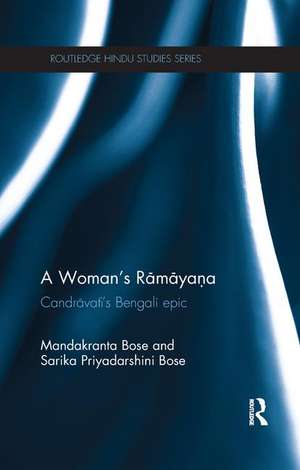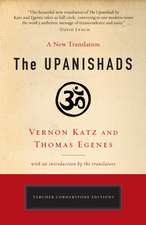A Woman's Ramayana: Candrāvatī's Bengali Epic: Routledge Hindu Studies Series
Autor Mandakranta Bose, Sarika Boseen Limba Engleză Paperback – 12 oct 2017
This book presents a translation and commentary on the text, with an extensive introduction that scrutinizes its social and cultural context and correlates its literary identity with its ideological implications. Taken together, the narrative and the critical study offered here expand the understanding both of the history of women’s self-expression in India and the cultural potency of the epic tale. The book is of interest equally to students and researchers of South Asian narratives, Rāmāyana studies and gender issues.
| Toate formatele și edițiile | Preț | Express |
|---|---|---|
| Paperback (1) | 335.76 lei 6-8 săpt. | |
| Taylor & Francis – 12 oct 2017 | 335.76 lei 6-8 săpt. | |
| Hardback (1) | 1105.56 lei 6-8 săpt. | |
| Taylor & Francis – 13 iun 2013 | 1105.56 lei 6-8 săpt. |
Din seria Routledge Hindu Studies Series
-
 Preț: 312.03 lei
Preț: 312.03 lei - 15%
 Preț: 404.27 lei
Preț: 404.27 lei -
 Preț: 469.34 lei
Preț: 469.34 lei -
 Preț: 411.42 lei
Preț: 411.42 lei - 31%
 Preț: 762.97 lei
Preț: 762.97 lei -
 Preț: 484.47 lei
Preț: 484.47 lei - 15%
 Preț: 296.53 lei
Preț: 296.53 lei - 18%
 Preț: 1059.84 lei
Preț: 1059.84 lei - 25%
 Preț: 766.65 lei
Preț: 766.65 lei - 18%
 Preț: 1059.84 lei
Preț: 1059.84 lei -
 Preț: 414.32 lei
Preț: 414.32 lei -
 Preț: 309.69 lei
Preț: 309.69 lei - 31%
 Preț: 765.43 lei
Preț: 765.43 lei - 18%
 Preț: 1054.71 lei
Preț: 1054.71 lei - 15%
 Preț: 455.81 lei
Preț: 455.81 lei -
 Preț: 446.75 lei
Preț: 446.75 lei -
 Preț: 442.68 lei
Preț: 442.68 lei - 12%
 Preț: 300.29 lei
Preț: 300.29 lei -
 Preț: 414.32 lei
Preț: 414.32 lei - 18%
 Preț: 1056.14 lei
Preț: 1056.14 lei - 18%
 Preț: 1057.75 lei
Preț: 1057.75 lei -
 Preț: 486.42 lei
Preț: 486.42 lei -
 Preț: 475.88 lei
Preț: 475.88 lei -
 Preț: 411.85 lei
Preț: 411.85 lei - 18%
 Preț: 1222.16 lei
Preț: 1222.16 lei - 26%
 Preț: 820.73 lei
Preț: 820.73 lei - 15%
 Preț: 466.60 lei
Preț: 466.60 lei - 18%
 Preț: 1057.89 lei
Preț: 1057.89 lei -
 Preț: 469.34 lei
Preț: 469.34 lei -
 Preț: 486.98 lei
Preț: 486.98 lei - 31%
 Preț: 763.39 lei
Preț: 763.39 lei -
 Preț: 411.64 lei
Preț: 411.64 lei - 18%
 Preț: 1002.80 lei
Preț: 1002.80 lei - 26%
 Preț: 762.89 lei
Preț: 762.89 lei - 18%
 Preț: 1339.41 lei
Preț: 1339.41 lei
Preț: 335.76 lei
Preț vechi: 385.49 lei
-13% Nou
Puncte Express: 504
Preț estimativ în valută:
64.24€ • 67.08$ • 53.05£
64.24€ • 67.08$ • 53.05£
Carte tipărită la comandă
Livrare economică 16-30 aprilie
Preluare comenzi: 021 569.72.76
Specificații
ISBN-13: 9781138575417
ISBN-10: 1138575410
Pagini: 176
Ilustrații: 4 Halftones, black and white; 4 Illustrations, black and white
Dimensiuni: 138 x 216 x 14 mm
Greutate: 0.33 kg
Ediția:1
Editura: Taylor & Francis
Colecția Routledge
Seria Routledge Hindu Studies Series
Locul publicării:Oxford, United Kingdom
ISBN-10: 1138575410
Pagini: 176
Ilustrații: 4 Halftones, black and white; 4 Illustrations, black and white
Dimensiuni: 138 x 216 x 14 mm
Greutate: 0.33 kg
Ediția:1
Editura: Taylor & Francis
Colecția Routledge
Seria Routledge Hindu Studies Series
Locul publicării:Oxford, United Kingdom
Public țintă
PostgraduateCuprins
1. Introduction 2. Candrāvatī Rāmāyana Part 1 3. Candrāvatī Rāmāyana Part 2 4. Candrāvatī Rāmāyana Part 3 5. Appendix 1. Vālmīki Rāmāyana 6. Appendix 2. Krttivāsī Rāmāyana 7. Appendix 3. Narrative Parallels and Omissions 8. Appendix 4. Nayāncāñd Ghos's Candrāvatī 9. Appendix 5. Glossary
Notă biografică
Mandakranta Bose is Professor Emerita at the University of British Columbia, Canada. She has published widely on the classical performing arts and literature of India, gender studies and Hinduism.
Sarika Priyadarshini Bose is Lecturer in English at the University of British Columbia, Canada. Her research interests and publications include Victorian drama and theatre, children’s literature, gender studies and composition.
Sarika Priyadarshini Bose is Lecturer in English at the University of British Columbia, Canada. Her research interests and publications include Victorian drama and theatre, children’s literature, gender studies and composition.
Recenzii
"This book is a useful contribution to world literature in the sense that it in a way brings to light a work that was mostly orally transmitted, and that too in a vernacular language, so that now the non-Bengali speaker has access to it. It can therefore be of interest to any Ramayana enthusiast, to scholars studying Bengali/Indian literature(s), and/or women’s writings, but also to the general public, because the whole book, including (if not especially) the translation, is accessible to the non-specialist as well."
Suganya Anandakichenin, E´cole francaise d’Extreˆme-Orient
The Journal of Hindu Studies 2015;8:323–324
Suganya Anandakichenin, E´cole francaise d’Extreˆme-Orient
The Journal of Hindu Studies 2015;8:323–324
Descriere
The Rāmāyana, an Indian epic, is one of the world’s best-loved stories. Made available in English for the first time, this version by a female poet from Bengal is very direct, touching, timely, and accessible. The three-part poem is a highly individual rendition of the ancient epic, and instead of celebrating masculine heroism it laments the suffering of women caught in the play of male ego.
This book presents a translation and commentary on the text, and provides readers with an alternative view of the tale. It expands the understanding both of the history of women’s self-expression in India and the cultural potency of the epic tale. The book is of interest to students and researchers of South Asian studies, Rāmāyaṇa studies and women’s and gender studies.
This book presents a translation and commentary on the text, and provides readers with an alternative view of the tale. It expands the understanding both of the history of women’s self-expression in India and the cultural potency of the epic tale. The book is of interest to students and researchers of South Asian studies, Rāmāyaṇa studies and women’s and gender studies.












